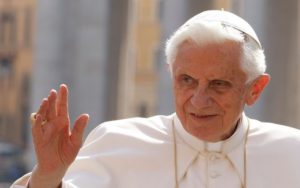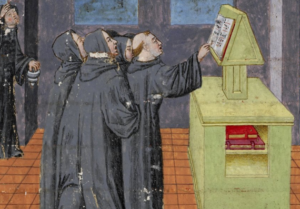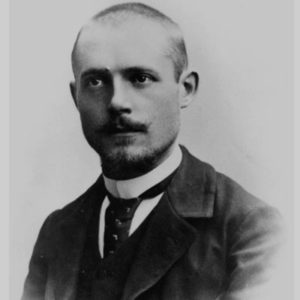 Pope Emeritus Benedict XVI has been called the Mozart of Theology. Like Mozart’s music, his writings charm and delight, transporting the soul to heavenly spheres. He can effortlessly intone a piercing chord that strikes at the heart of reality, moving the reader to greater devotion to God. But sometimes he often focuses our gaze on unseemly realities: for example, the crisis of Modernity. Nevertheless, he always ends his addresses on an encouraging note. In particular, my favorite address is one he delivered at a meeting with Representatives from the World of Culture in Paris on September 12, 2008. Unfortunately, this address did not receive much publicity; it was not controversial like the Regensburg Address. And while the media – the paragon of superficiality -mostly overlooked the substance of the Regensburg Address to focus on a section that seemed Islamophobic, the Regensburg Address and the Address in Paris contain gems that are worth reflecting on to this day. The Address in Paris is about culture. But instead of generically talking about culture, Benedict XVI simply described– a brilliant move on his part – the ancient monks’ search for God (quaerere Deum) and the culture that sprang from that. He says,
Pope Emeritus Benedict XVI has been called the Mozart of Theology. Like Mozart’s music, his writings charm and delight, transporting the soul to heavenly spheres. He can effortlessly intone a piercing chord that strikes at the heart of reality, moving the reader to greater devotion to God. But sometimes he often focuses our gaze on unseemly realities: for example, the crisis of Modernity. Nevertheless, he always ends his addresses on an encouraging note. In particular, my favorite address is one he delivered at a meeting with Representatives from the World of Culture in Paris on September 12, 2008. Unfortunately, this address did not receive much publicity; it was not controversial like the Regensburg Address. And while the media – the paragon of superficiality -mostly overlooked the substance of the Regensburg Address to focus on a section that seemed Islamophobic, the Regensburg Address and the Address in Paris contain gems that are worth reflecting on to this day. The Address in Paris is about culture. But instead of generically talking about culture, Benedict XVI simply described– a brilliant move on his part – the ancient monks’ search for God (quaerere Deum) and the culture that sprang from that. He says,
 “It was not their intention to create a culture nor even to preserve a culture from the past. Their motivation was much more basic. Their goal was: quaerere Deum. Amid the confusion of the times, in which nothing seemed permanent, they wanted to do the essential – to make an effort to find what was perennially valid and lasting, life itself. They were searching for God.”
“It was not their intention to create a culture nor even to preserve a culture from the past. Their motivation was much more basic. Their goal was: quaerere Deum. Amid the confusion of the times, in which nothing seemed permanent, they wanted to do the essential – to make an effort to find what was perennially valid and lasting, life itself. They were searching for God.”
At a time of cultural crisis – something, I think, all faithful Christians should recognize – it is fitting to reflect on the example of those who set out to find God and give up everything to follow Him, finding in Him their very all. While it is good to desire the creation of a robust, God-centered “culture”, too often this gets caught up in talk and no action. Theory is good but that must be translated into flesh and blood. Some concrete order (arrangement) in-forms individual lives. It might be good to look and see what informs you.
Culture stems from the specific actions and beliefs of its individuals that ultimately stem from one’s relation to God. True culture comes about inadvertently. Culture can never really be set up but must come about through values beyond oneself. That is why the quaerere Deum is at the root of culture. In the Bible, Israel either worship the true God or an idol. This tension informs its culture. The Consecrated Life is focused on giving up all so as to better worship the true God. It translates itself into particular rules (ordos) that bring about a specific culture. These specific orders need to be appreciated and taken up if Catholics want to be serious about a truly living culture.
Narratives of decline are very popular in the West, and while they can help us better understand our current situation, a temptation to lose the virtue of hope arises. Many people question whether a genuine Christian culture exists, seeing nothing but a culture of death. Some social commentators see themselves as writing the obituary of a Christian West. If you find yourself caught in such a condition, it would be helpful to read an early-twentieth century French poet, Charles Péguy.
For Péguy, hope was the most precious of all God’s gifts. In his famous poem The Portal of the Mystery of Hope, Péguy depicts hope as a little child between her two older sisters, faith and charity. Hope is small and vulnerable, needing protection. God delights the most in such a little child.
 Péguy died at the beginning of World War I. This devastating war seemed to crush all hope, at least according to secular humanism’s understanding of it. Péguy intuited that Christian hope, more than ever, needed to be protected. A century later, Benedict turned our attention, once again, to Christian hope. He wrote an encyclical on it, but he also integrated that theme into many of his addresses. Benedict knew that Christian hope stems from the Resurrection and the radical decision to give one’s all to belong to the Lord. His General Audiences focused on the lives of great saints, inspiring people to set out on the same path to sanctity, particularly as lived in the Consecrated Life. For our purposes, the Consecrated Life is Péguy’s little child that needs to be protected at all costs, for the seed from which a genuine Christian culture will grow.
Péguy died at the beginning of World War I. This devastating war seemed to crush all hope, at least according to secular humanism’s understanding of it. Péguy intuited that Christian hope, more than ever, needed to be protected. A century later, Benedict turned our attention, once again, to Christian hope. He wrote an encyclical on it, but he also integrated that theme into many of his addresses. Benedict knew that Christian hope stems from the Resurrection and the radical decision to give one’s all to belong to the Lord. His General Audiences focused on the lives of great saints, inspiring people to set out on the same path to sanctity, particularly as lived in the Consecrated Life. For our purposes, the Consecrated Life is Péguy’s little child that needs to be protected at all costs, for the seed from which a genuine Christian culture will grow.
In Spe Salve, Pope Benedict wrote, “The one who has hope lives differently; the one who has hope has been granted the gift of new life” (§2). This new life is the gift of God. It is a participation in His Communion, the source of all life. But this does not arise automatically. It must be sought for. Not in order to create a new culture but in order to find God and rest in Him. I encourage you to read the Pope Emeritus’ address to have a deeper appreciation for the monks’ desire for God and the beautiful way of life that sprang from it.